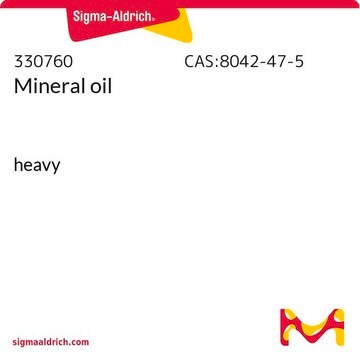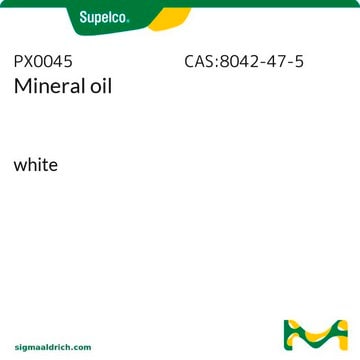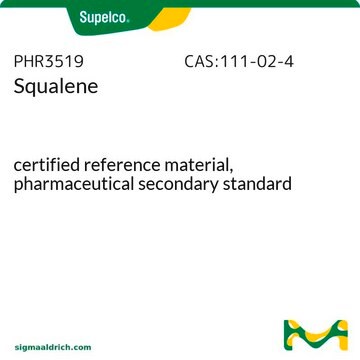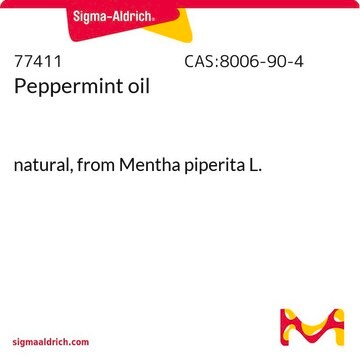59980
Jojoba oil from Simmondsia chinensis
tested according to DAC
Synonym(s):
Jojobae oelum, Jojoba bean oil, Jojoba liquid wax
Sign Into View Organizational & Contract Pricing
All Photos(1)
About This Item
Recommended Products
Looking for similar products? Visit Product Comparison Guide
Related Categories
Application
- Topical application of jojoba (Simmondsia chinensis L.) wax enhances the synthesis of pro-collagen III and hyaluronic acid and reduces inflammation in the ex-vivo human skin organ culture model.: This research demonstrates that jojoba wax can significantly enhance skin health by boosting collagen synthesis and reducing inflammation, making it a valuable ingredient in dermatological applications (Tietel et al., 2024).
- Passive Enhancement of Retinol Skin Penetration by Jojoba Oil Measured Using the Skin Parallel Artificial Membrane Permeation Assay (Skin-PAMPA): A Pilot Study.: This pilot study shows that jojoba oil can enhance the penetration of retinol into the skin, suggesting its potential to improve the efficacy of topical retinol treatments (Gruber et al., 2023).
- Anti-Herpes Simplex 1 Activity of Simmondsia chinensis (Jojoba) Wax.: This article reports on the antiviral properties of jojoba wax, specifically against Herpes Simplex Virus 1, providing a basis for its use in antiviral formulations (Tietel et al., 2021).
- Inhalable Jojoba Oil Dry Nanoemulsion Powders for the Treatment of Lipopolysaccharide- or H(2)O(2)-Induced Acute Lung Injury.: This study investigates the use of jojoba oil in inhalable nanoemulsion powders for treating acute lung injury, highlighting its therapeutic potential in respiratory conditions (Zhang et al., 2021).
Storage Class Code
10 - Combustible liquids
WGK
WGK 3
Flash Point(F)
Not applicable
Flash Point(C)
Not applicable
Personal Protective Equipment
dust mask type N95 (US), Eyeshields, Gloves
Certificates of Analysis (COA)
Search for Certificates of Analysis (COA) by entering the products Lot/Batch Number. Lot and Batch Numbers can be found on a product’s label following the words ‘Lot’ or ‘Batch’.
Already Own This Product?
Find documentation for the products that you have recently purchased in the Document Library.
Customers Also Viewed
Elia Ranzato et al.
Journal of ethnopharmacology, 134(2), 443-449 (2011-01-08)
The wound healing properties of jojoba (Simmondsia chinensis) liquid wax (JLW) were studied in vitro on HaCaT keratinocytes and human dermal fibroblasts, which are involved in wounded skin repair. JLW cytotoxicity was evaluated by the crystal violet staining and the
Nagesh A Wagdare et al.
Colloids and surfaces. B, Biointerfaces, 88(1), 175-180 (2011-07-19)
Microcapsules were prepared by microsieve membrane cross flow emulsification of Eudragit FS 30D/dichloromethane/edible oil mixtures in water, and subsequent phase separation induced by extraction of the dichloromethane through an aqueous phase. For long-chain triglycerides and jojoba oil, core-shell particles were
Fadhel Jaafar et al.
La Tunisie medicale, 90(2), 108-115 (2012-03-13)
The regularity of a compressive knit is defined as its ability to perform its function in a burnt skin. This property is essential to avoid the phenomenon of rejection of the material or toxicity problems But: Make knits biocompatible with
Y Le Dréau et al.
Analytica chimica acta, 642(1-2), 163-170 (2009-05-12)
As the jojoba oil was used in cosmetic, pharmaceutical, dietetic food, animal feeding, lubrication, polishing and bio-diesel fields, it was important to study its aging at high temperature by oxidative process. In this work a FT-MIR methodology was developed for
Mahmoud Bahgat et al.
Acta poloniae pharmaceutica, 66(3), 333-340 (2009-08-04)
A cyclohexanecarboxamide derivative, N-phenyl-N-[1-(piperidine-1-carbonyl)cyclohexyl] benzamide (MNRC-5), was evaluated for its inhibitory effects on Schistosoma mansoni cercarial serine protease activity and cercarial penetration. MNRC-5 exerted an inhibitory effect on S. mansoni cercarial serine protease at serial concentrations of the specific chromogenic
Our team of scientists has experience in all areas of research including Life Science, Material Science, Chemical Synthesis, Chromatography, Analytical and many others.
Contact Technical Service












